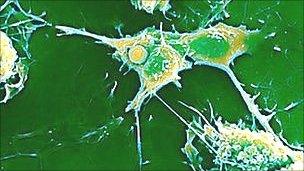Genetic clues to what triggers MS
- Published

In MS, the immune system attacks myelin in nerve fibres
Around 30 genetic risk factors for developing multiple sclerosis have been discovered by a UK-led team.
It brings to more than 50 the total number of genetic clues to the disease.
The research, published in Nature, will help identify risk factors and perhaps future treatments or even a cure, said the MS Society.
Most of the genes are linked to immunity, backing the idea that the disease is triggered when the immune system turns against itself.
Genes are only part of the story, however, with other factors, such as vitamin D deficiency or a viral infection, thought to play an important role.
The study, carried out by a consortium of international researchers, led by the universities of Oxford and Cambridge, is the largest yet into genes and MS.
It looked at DNA from almost 10,000 MS patients, and more than 15,000 healthy controls.
Twenty three known genetic variations, common in the general population, that give a tiny increase in the risk of getting MS were confirmed, and 29 new ones identified.
Another five are strongly suspected as being involved, bringing the total number of genetic variations associated with MS to 57.
Professor Alistair Compston of the University of Cambridge told the ±«Óătv: "This is suddenly a big new number of genes to try to understand.
"80% of the genes that are implicated by the 57 'hits' are immunological. This shouts out that this is an immunological disease at the beginning. This is a very important confirmation."
Around 2.5 million people around the world have MS, 100,000 of them in the UK.
MS is not directly inherited and there is no single gene that causes it. However, research suggests a combination of genes common in the general population make some people more susceptible to developing the neurological disorder.
Other factors are involved, possibly something in the environment, such as an infection or bacteria, or lack of Vitamin D.
Simon Gillespie, Chief Executive of the MS Society said: "By identifying which genes may trigger the development of MS, we can identify potential 'risk factors' and look at new ways of treating, or even preventing, the condition in the future."
Some of the genes found to be important in MS are also implicated in other autoimmune disorders, such as Crohn's disease and Type 1 diabetes, a separate research paper, published in PLoS Genetics, has reported.
- Published5 December 2010
- Published19 April 2011